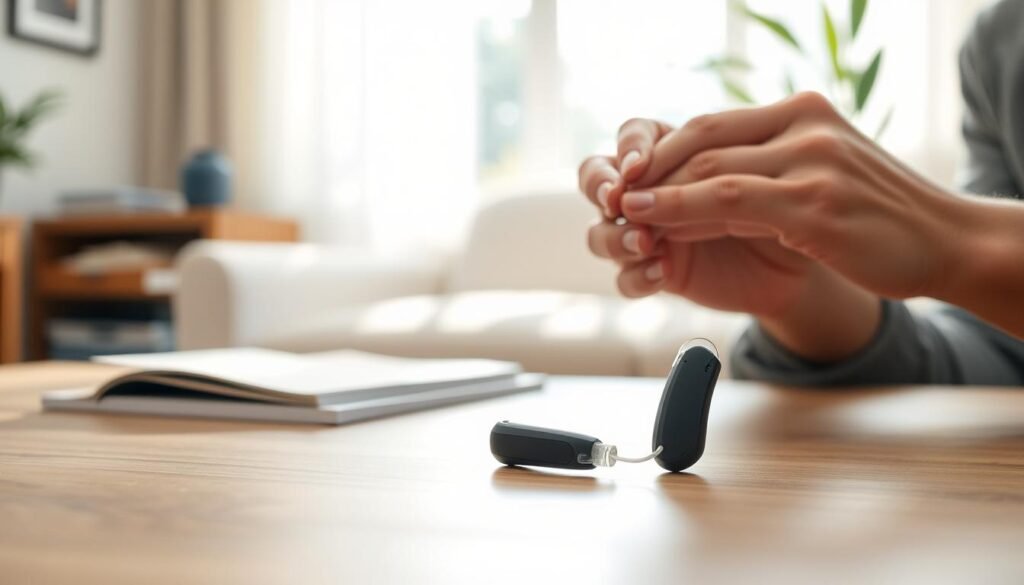About 28.8 million adults in the U.S. could use hearing aids. This fact shows how common auditory fatigue is. It affects many people, even those without hearing loss. Auditory fatigue can make social events tiring, leaving you drained by the day’s end.
This issue comes from the effort to hear sounds and speech clearly. In noisy places, it’s hard to follow conversations. This can cause headaches and make people avoid socializing. Often, people don’t realize that this fatigue is related to their hearing health.
Some joke that auditory fatigue is a “silent epidemic.” It hits many in our world full of virtual meetings, where we have to listen carefully for a long time. Knowing why it happens and how to ease it is crucial. For tips on dealing with auditory fatigue, check this useful link on managing auditory fatigue.
Key Takeaways
- Listening fatigue is often an early sign of hearing loss.
- Mental tiredness and headaches are common after long listening sessions.
- Anyone can get auditory fatigue, no matter their hearing status.
- It’s important to practice good listening habits to avoid ear fatigue.
- Devices that help listening can lower the strain on your ears.
- Getting your hearing checked regularly can help find good solutions.
Understanding Auditory Fatigue
Auditory fatigue is something many don’t notice but deeply affects people with hearing loss. It happens when they feel tired from trying to hear sounds. It’s especially hard during conversations, demanding a lot of brain power. This tiredness comes from needing to focus hard, even reading lips to understand what’s being said.
Studies show that those with hearing problems experience more fatigue than others. Noise makes it harder to understand speech, making them feel more worn out. This extra effort impacts their everyday life.
Recovering from auditory fatigue varies. Short-term fatigue goes away in minutes, but long-term fatigue needs days to get better. How quickly someone recovers depends on the noise they’ve dealt with and their hearing ability. It’s key for people to know the signs of auditory fatigue and how to handle it.
What Causes Auditory Fatigue?
Many things cause auditory fatigue, which relates to the effort it takes to hear. It’s important for those with hearing challenges to understand these causes. This understanding helps manage issues like effort-related fatigue and listening fatigue.
Effort-Related Fatigue
Effort-related fatigue happens when people use a lot of mental energy to hear sounds and ignore background noise. This is especially true for individuals with hearing loss. Trying to follow conversations uses more brain power, which leads to feeling tired and uncomfortable. This type of fatigue can make everyday tasks harder.
To deal with this, taking regular breaks and staying in places with clear sound helps. You can find more tips on keeping your energy up and avoiding fatigue here.
Adjusting to Hearing Aids
Hearing aids can really help with effort-related fatigue by making sounds clearer. But, getting used to them might feel stressful at first. This is because they let users hear sounds they couldn’t hear before, which can be overwhelming. Taking it slow and allowing yourself time to adjust is key.
Short breaks are also helpful in managing this new strain. Making sure you’re comfortable with your hearing aids will make the transition easier and more effective.

Symptoms of Auditory Fatigue
Auditory fatigue has a big impact on well-being. It’s important to know the early signs. These include feeling mentally drained and physically uncomfortable. This happens from the hard work of listening and understanding sounds.
Mental Exhaustion
Mental tiredness is a main sign of auditory fatigue. People often feel overwhelmed by daily chats and noises. It takes a lot of energy to process sounds. This can wear you out emotionally, affecting your social life and happiness.
This stress can lead to irritability, losing interest, and trouble focusing. When it’s hard to understand sounds, people might not remember things well or pay attention for long. It’s key to manage your sound environment and get the right help if needed.
Physical Discomfort and Ear Strain
Physical discomfort often comes with mental exhaustion. Symptoms like ear strain feel like pressure or pain in the ears. It tells you that you need to rest your ears. This pain can turn into headaches and more tiredness, lowering your life quality.
Feeling pain in the ears, being generally worn out from listening, and stress from communication issues are common. By lowering how much noise you hear daily, you can save energy. Good sleep is also vital for fighting auditory tiredness. It helps in healing both your mind and body.

| Symptom | Description |
|---|---|
| Mental Exhaustion | Cognitive overload leading to irritability and concentration challenges. |
| Emotional Fatigue | Feeling drained and struggling with social interactions. |
| Physical Discomfort | Pain or strain in the ears, headaches, and overall tiredness. |
| Ear Strain | Pressure in the ears indicating a need for auditory rest. |
How Auditory Overload Affects Daily Life
Auditory overload can deeply impact daily interactions. People with sound sensitivity have a hard time in loud places. This includes crowded public spaces or busy restaurants. They find it hard to hear conversations over background noise. This leads to tiredness and wanting to be alone.
About 4.6 million Canadians deal with hearing loss. These individuals often feel overwhelmed in noisy settings. Loud environments make it tough for them to join in on social events. They end up feeling very tired. This tiredness can make them more anxious and easily annoyed.
In the workplace, auditory overload can cause problems. It can lead to misunderstandings and less work getting done. Around 64% of workers in noisy jobs suffer from listening tiredness. Things like lifestyle, work demands, and other health issues can make this worse. This affects how well they perform at their jobs.

People with hearing loss often prefer to stay by themselves. This is because it’s exhausting to try to hear over noise. Handling auditory overload well can improve how they get along in social situations. It also helps keep their mental health good. Getting hearing checks regularly is key. It helps find and deal with hearing issues, leading to a more active life and better daily interactions.
Strategies for Reducing Auditory Fatigue
To keep your hearing system healthy, you need smart plans. Using special methods can ease auditory exhaustion and make listening better.
Taking Regular Breaks
It’s crucial to take breaks often to fight auditory fatigue. Quiet moments help your ears rest from the hard work of hearing sounds. Some good habits are:
- Short naps, around 15-20 minutes, can make you more alert and energetic.
- Walking outside without distractions for 10-15 minutes can lift your spirits.
- Trying out calming exercises, like meditation, helps refocus and unwind.
- Choosing to enjoy silence for a few hours, staying away from noises from things like TV or music.
Utilizing Assistive Listening Devices
Assistive listening tools are key in fighting auditory fatigue. They make words clearer and reduce unwanted noise. People should check out different hearing aids, including:
- FM systems that send sound straight to you.
- Hearing loops that improve sound in public areas.
Using these tools often makes listening less tiring. This lets you join in on talks easier without feeling drained. Learning about these aids can also make your daily interactions more rewarding.
Environmental Considerations for Managing Ear Strain
Making a good listening space is key for managing ear strain. It helps those with hearing issues feel more comfortable. Picking places with little noise helps make sounds clearer and less distracting.
We should check different places, like work or social spots, to make them better for people sensitive to noise. The design of a room and its acoustics affect how we hear sounds.
Choosing the Right Spaces
Choosing the right spaces can make a big difference. Quiet spots or those with good acoustics make listening easier. For instance, a well-set office that blocks unwanted sounds can boost work and lessen ear strain.
Look for places where you can chat easily without noise in the background. It’s wise to steer clear of very loud places, especially for those hard of hearing.
Minimizing Background Noise
Lowering background noise is crucial to lessen ear strain and avoid feeling overwhelmed by sounds. Turning down the TV or music while talking is one way to do this. Picking quieter times for meet-ups can also enhance how we hear.
Becoming aware of the sounds around us helps manage them better, supporting our hearing health. Noticing these sound factors can ease the tiredness from trying to listen in tough spots. Check out sleep hygiene tips for more on sleep and well-being.
| Auditory Environment Factors | Strategies for Improvement |
|---|---|
| Background Noise Levels | Reducing volume during conversations |
| Acoustic Design | Opting for soundproof rooms |
| Time of Day | Scheduling activities during quieter periods |
| Type of Venue | Choosing spaces with good acoustics |
Improvement Techniques for Listening Efforts
Boosting listening skills is vital for people dealing with auditory fatigue. Effective strategies can enhance communication and reduce auditory fatigue. These strategies improve speechreading and communication, making conversations easier.
Developing Speechreading Skills
Enhancing speechreading is key to lowering listening effort. It involves understanding gestures and visual cues to improve conversation understanding. This can make listening easier and reduce cognitive stress. Speechreading training helps with better interactions and lessens auditory fatigue.
Effective Communication Strategies
Using specific communication strategies can greatly better interaction quality. People with hearing challenges should express their needs for clearer and slower speech. Conversations in quiet places or one-on-one can make communication smoother and less mentally exhausting. These effective methods can significantly improve auditory experiences and aid in clear communication across different scenarios.
To discover more tips and strategies, check out this detailed guide on overcoming auditory fatigue effectively.
Seeking Professional Help for Auditory Fatigue
Getting help from experts is crucial for managing auditory fatigue effectively. If you’re facing hearing challenges, seeing an audiologist is a smart move. These professionals do detailed hearing tests. They find out what your hearing issues are. Then, they create a plan just for you. This way, you learn about your hearing problems. And you discover how to improve them.
Consulting with Audiologists
Audiologists play a key role in tackling auditory fatigue. They give you a custom assessment. This helps you deal better with sounds around you. They might suggest ways to manage auditory fatigue. This could include better ways to communicate. Or how to use hearing aids more effectively. Meeting with an audiologist can make daily life much easier. It helps you handle listening challenges better.
Exploring Treatment Options
There are many treatments for auditory fatigue. Hearing aids are one great tool. They make sounds clearer. And they reduce the effort of listening amid noise. Audiologists can adjust hearing aids just for you. Plus, auditory training therapies teach you how to deal with fatigue. For more tips, look into treatment options suggested by experts.
Conclusion
Understanding auditory fatigue requires knowledge of its causes and awareness of its main symptoms. Learning how to handle it helps reduce the tiredness from too much noise. Research on call center workers shows the importance of fighting fatigue to better hear and feel good.
Taking short breaks and using devices that help with hearing are key to lessening the bad effects of too much sound. Making the places we listen in better can also improve our hearing experiences. This helps us interact better with others and keep a good balance in our lives.
In summary, getting to know how auditory fatigue works helps us find ways to ease it. Putting in the time and effort to manage it well leads to a better hearing world. This makes for clearer conversations and connections, whether we’re at home or work.